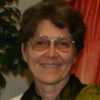The third in our 2016 spirituality series on the Jubilee Year of Mercy
[googlefont font=“Cormorant Infant” fontsize=”20″]By Susan Nagele, MKLM[/googlefont]
Serving with Maryknoll Lay Missioners in East Africa over the last 30 years, I have watched as the AIDS pandemic swept over the region. We have made strides in education about and treatment of HIV/AIDS but stigma still reigns. That can be as heartbreaking as the disease itself. As a family physician, I move from clinic to clinic in both rural and urban Kenya seeing patients and teaching the staffs.
One day, a nurse brought little Joseph to see me. He was in severe pain, with swellings on his cheeks that were growing rapidly. He and his mother, Anne, both have HIV. Infected from birth, Joseph hadn’t begun treatment until the very late age of 5. Anne was adamant we shouldn’t tell anyone in her family about the HIV infection. She was terrified her mother-in-law would broadcast her ‘sin’ to the whole village. This illness is a huge dishonor to the family.
I knew Joseph had cancer and would need to go to the provincial hospital for treatment. That would cost a lot of money. We didn’t charge them and gave them $25 to get started on a journey that would most likely bring little Joseph back to God. He would die of stigma and judgmental attitudes that exclude him and his mother from family and community.

Maryknoll Lay Missioners in East Africa over the last 30 years, I have watched as the AIDS pandemic swept over the region.
At another clinic I was called to see Mary, who was hospitalized in midlife with a severe stroke. She, too, was HIV-positive and she knew it. She had left her children and roamed the streets with many men, perhaps because of her own shame and self-stigma, believing herself unredeemable and unworthy of treatment. Her husband had tried repeatedly to bring her back home and help her to get the care she needed. She always refused.
One day I walked into the ward to find a well-dressed woman sitting in the chair near Mary’s bed. She was about the same age as Mary. She didn’t say much and seemed distant, but at least she was someone I could talk to, as Mary couldn’t speak. After reviewing the long litany of Mary’s ailments, I explained to the woman, who was married into the family, that we needed to elevate the head of the bed so Mary could breathe better and not aspirate something into her lungs. The nurse and I scoured this electric bed, imported from Europe, for a way to raise the head. But we had no electricity and couldn’t find a crank to lift it ourselves. I wrote my orders and moved on to the next patient while the nurse went to look for pillows.
When I returned a short time later, I found Mary’s visitor sitting in the hospital bed with Mary propped up on her chest. A bevvy of family members had arrived, including Mary’s husband and several women, who were arranging the bedding, wiping Mary’s face and gently spooning some thickened cereal into her mouth. I have no idea what faith tradition they came from, but they were fairly well educated and lived in the town nearby. I listened as they poured out their frustrations over many years of being unable to help Mary. Now that she was completely incapacitated, they could finally shower her with their love and tenderness. They only wanted her to get better and come back to live with them.
Traditional rural customs and rituals where I have worked in Tanzania, South Sudan and Kenya have usually been very caring and attentive to family members in need. But they can be judgmental and severe when issues of morality and sexuality are concerned, as I saw with Anne and little Joseph.
Yet, Pope Francis has given us all a challenge, to see as Jesus saw, through the lens of mercy. That’s what I witnessed at Mary’s bedside. Mary died in the hospital about a week after I saw her. She went back to God surrounded by the love and mercy of her family and friends.

